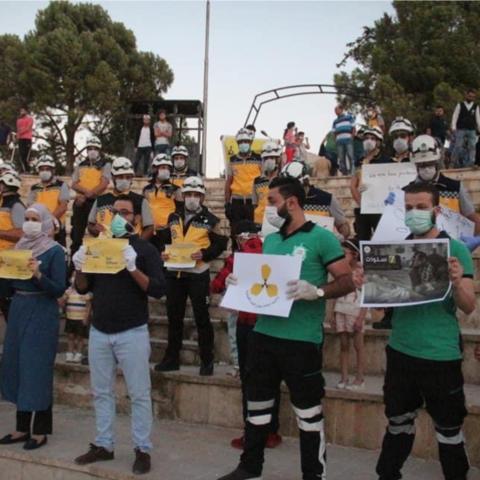
Syrian activists around the world commemorated the tenth anniversary of the victims of the Syrian regime's chemical attack. This attack on the population of "Ghouta Damascus" on August 21, 2013 killed about 1,450 civilians, including more than 200 children and women, and wounded 6,000 others, according to data from the Syrian Network for Human Rights.
Despite the decade that elapsed, the families of the victims are still demanding that those responsible for this horrific massacre, considered the most tragic of the Syrian revolution that began in 2011, be held accountable.
The Syrian regime's attacks are supported by various countries, especially Russia and Iran, through various large-scale tools. No deterrent measures have been taken against war crimes and crimes against humanity that the country has witnessed throughout the war years.
On that occasion, the United Nations High Representative for Disarmament Affairs, Izumi Nakamitsu, stressed that any use of chemical weapons is unacceptable and constitutes a flagrant violation of international law.
In a briefing to the Security Council on Resolution 2118 on eliminating Syria's chemical weapons program, the UN official said international responsibility, especially to victims, requires identifying those responsible for the use of chemical weapons and ensuring they are held accountable. The United Nations will continue to support all efforts to strengthen the rules against chemical weapons and make them a thing of the past.
Nakamitsu said that all efforts to hold consultations between the OPCW assessment team and the Syrian authorities have been unsuccessful, stressing the importance of Syria's full cooperation with the OPCW Technical Secretariat to resolve all outstanding issues.
The UN official urged members of the UN Security Council to unite behind the goal of eliminating chemical weapons and show leadership by stressing zero tolerance for impunity for the use of these weapons.
ALKARAMA'S ACTION
In a similar attack on April 4, 2017, 92 Syrians, including children and women, were killed by sarin gas during an aerial bombardment by Syrian army planes targeting the Khan Sheikhoun area in northwestern Idlib governorate.
Alkarama and Human Rights Defenders, on behalf of the families of a number of victims, submitted complaints to the Special Rapporteur on extrajudicial, summary or arbitrary executions and to the International Independent Commission of Inquiry on the Syrian Arab Republic.
Witnesses reported that on April 4, 2017, they heard on the radio about an imminent aerial bombardment of planes taking off from the Shayrat base near the city of Homs, home to the 50th brigade, and that an aircraft fired about four missiles at the city of Khan Sheikhoun. They also reported seeing a plane drop a bomb on the north of the city and smoke rise without hearing any explosions.
While Syria denies any use of chemical weapons, international NGOs have pointed to the use of sarin gas based on testimonies and symptoms of victims and remnants of weapons. Biological samples taken from victims and examined by the Organisation for the Prohibition of Chemical Weapons (OPCW) have also proved that sarin gas was the cause of death.
Several countries, including the United States, France and the United Kingdom, have concluded that the attack was carried out by the Syrian Air Force, but it is surprising that the Syrian regime and its affiliated militias still have direct or indirect support from Western governments.
